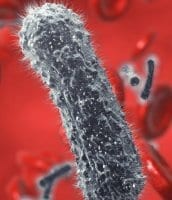
Scientists report that they have developed a method that cuts down the time it takes to make new parts for microscopic biological factories.
The scientists, from Imperial College London, say their research brings them another step closer to a new kind of industrial revolution, where parts for these biological factories could be mass-produced. These factories have a wealth of applications including better drug delivery treatments for patients, enhancements in the way that minerals are mined from deep underground and advances in the production of biofuels.
Professor Paul Freemont, Co- Director of the Centre for Synthetic Biology and Innovation at Imperial College London and principal co-investigator of the study, which is published today in the journal Nucleic Acids Research, says:
“Before the industrial revolution most items were made by hand, which meant that they were slower to manufacture, more expensive to produce and limited in number. We are at a similar juncture in synthetic biology, having to test and build each part from scratch, which is a long and slow process. We demonstrate in our study a new method that could help to rapidly scale up the production and testing of biological parts.”
Parts made up of DNA are re-engineered by scientists and put into cells to make biological factories. However, a major bottleneck in synthetic biology is the lack of parts from which to build new types of factories. To build parts using the current time-consuming method, scientists have to re-engineer DNA in a cell and observe how it works. If it functions according to their specifications, then the scientists store the part specifications in a catalogue.
Now, scientists from Imperial College London have devised a much quicker method that does away with the need for them to re-engineer a cell every time they want to make a new part. The team say their work could lead to vast new libraries of off-the-shelf components that could be used to build more sophisticated biological factories.
James Chappell, co-author of the study from the Centre for Synthetic Biology and Innovation at Imperial College London, says:
“One of the major goals in synthetic biology is to find a way to industrialise our processes so that we can mass produce these biological factories much in the same way that industries such as car manufacturers mass produce vehicles in a factory line. This could unlock the potential of this field of science and enable us to develop much more sophisticated devices that could be used to improve many facets of society. Excitingly, our research takes us one step closer to this reality, providing a rapid way of developing new parts.”
The Latest Streaming News: Synthetic biology updated minute-by-minute
Bookmark this page and come back often
Latest NEWS
Latest VIDEO







